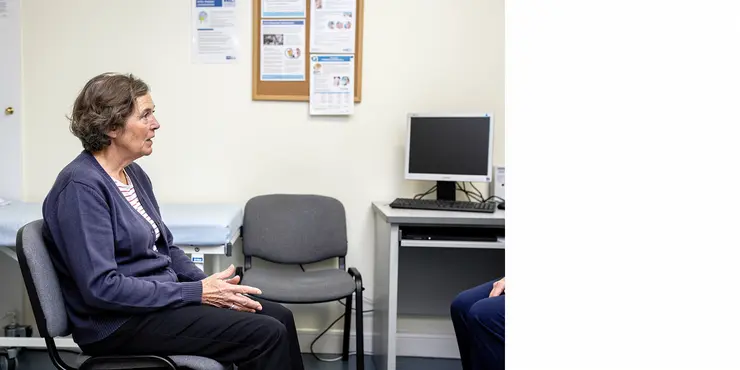
Find Help
More Items From Ergsy search
-

Is chronic fatigue syndrome contagious?
Relevance: 100%
-
What is chronic fatigue syndrome?
Relevance: 97%
-

What causes chronic fatigue syndrome?
Relevance: 91%
-
Is chronic fatigue syndrome a mental illness?
Relevance: 89%
-

Are there psychological aspects to chronic fatigue syndrome?
Relevance: 88%
-

Can chronic fatigue syndrome be managed with lifestyle changes?
Relevance: 88%
-

Who is at risk of developing chronic fatigue syndrome?
Relevance: 84%
-
Can children develop chronic fatigue syndrome?
Relevance: 82%
-

How is chronic fatigue syndrome treated?
Relevance: 81%
-

What role do infections play in chronic fatigue syndrome?
Relevance: 80%
-

Is there a cure for chronic fatigue syndrome?
Relevance: 76%
-

Myalgic encephalomyelitis or chronic fatigue syndrome (ME/CFS) | NHS
Relevance: 73%
-

How is chronic fatigue syndrome diagnosed?
Relevance: 67%
-

Can lifestyle changes help manage Carpal Tunnel Syndrome?
Relevance: 56%
-

How does CFS differ from regular fatigue?
Relevance: 49%
-

What is Cushing's syndrome?
Relevance: 41%
-

Can lifestyle changes help with postnatal depression?
Relevance: 39%
-

Are there lifestyle changes recommended with Baxdrostat?
Relevance: 38%
-
Can lifestyle changes help manage tinnitus?
Relevance: 38%
-

What is irritable bowel syndrome (IBS)?
Relevance: 38%
-

Carpal Tunnel Syndrome
Relevance: 37%
-
Can lifestyle changes help with health-related anxiety?
Relevance: 37%
-

Symptoms of irritable bowel syndrome (IBS)
Relevance: 37%
-

Can diet or lifestyle changes prevent appendicitis?
Relevance: 37%
-
Can lifestyle changes help with menopause masking?
Relevance: 37%
-

Chronic kidney disease: What are the treatments?
Relevance: 36%
-
Can weight loss medications cause fatigue?
Relevance: 36%
-

Are there any lifestyle changes that can help with hypotony?
Relevance: 36%
-

Diagnosing irritable bowel syndrome (IBS)
Relevance: 36%
-

Can lifestyle changes complement prostate cancer treatment?
Relevance: 36%
-

Can lifestyle changes impact the efficacy of cancer screening?
Relevance: 36%
-

Can lifestyle changes help prevent Super Flu?
Relevance: 36%
-

About irritable bowel syndrome (IBS)
Relevance: 36%
-

Do lifestyle changes need to accompany Ozempic for weight loss?
Relevance: 36%
-

Can lifestyle changes help manage ADHD?
Relevance: 35%
-

Can lifestyle changes replace the need for weight loss jabs?
Relevance: 35%
-

What is complex sleep apnea syndrome?
Relevance: 35%
-

Is Carpal Tunnel Syndrome covered by the NHS?
Relevance: 35%
-

Can lifestyle changes help prevent testicular cancer?
Relevance: 35%
-

What causes chronic kidney disease?
Relevance: 34%
Understanding Chronic Fatigue Syndrome
Chronic Fatigue Syndrome (CFS), also known as Myalgic Encephalomyelitis (ME), is a complex and debilitating disorder characterized by severe fatigue that is not improved by rest and is worsened by physical or mental activity. It can affect anyone but is more common in women and often develops in a person's mid-20s to mid-40s. The exact cause of CFS is unknown, and diagnosis can often be challenging, as its symptoms overlap with many other conditions.
The Role of Lifestyle Changes in Managing CFS
While there is currently no known cure for CFS, many patients find that certain lifestyle changes can help manage symptoms and improve quality of life. These changes typically focus on managing energy levels and stress, improving sleep quality, and optimizing nutrition and physical activity.
Energy Management and Rest
One of the most recommended strategies for managing CFS symptoms is pacing, which involves balancing activity and rest to avoid overexertion. Patients are encouraged to listen to their bodies and establish a routine that alternates periods of activity with rest. Identifying and respecting one's physical and mental limits is crucial to managing energy levels effectively.
Improving Sleep Quality
Good sleep hygiene can significantly impact the severity of CFS symptoms. Patients are advised to establish a regular sleep schedule, create a restful sleeping environment, and implement relaxation techniques before bedtime. Avoiding stimulants such as caffeine or electronic screens close to bedtime can also improve sleep quality.
Nutritional Considerations
A balanced diet with adequate hydration is essential for managing CFS. Some patients benefit from nutritional interventions, such as increasing the intake of omega-3 fatty acids, consuming a diet rich in fruits and vegetables, and reducing sugar and processed foods. Consulting with a nutritionist can help tailor a diet plan that suits individual needs and helps maintain energy levels.
Physical Activity
Although physical activity can be challenging for CFS patients, gentle and graded exercise programs may help improve symptoms over time. Patients are encouraged to start with low-intensity activities, such as walking or stretching, and gradually increase intensity based on tolerance. It's important to avoid pushing beyond one's limits, as this can exacerbate symptoms.
Stress Management
Stress can have a significant impact on CFS symptoms. Techniques such as mindfulness, meditation, yoga, and breathing exercises can help reduce stress and promote relaxation. Engaging in hobbies and seeking social support from friends, family, or CFS support groups can also be beneficial.
Conclusion
While chronic fatigue syndrome presents many challenges, adopting lifestyle changes can help manage its symptoms and improve overall wellbeing. It's important for patients to work closely with healthcare professionals to develop a personalized management plan that considers their specific needs and circumstances. By making informed lifestyle adjustments, many individuals with CFS can experience a better quality of life.
Understanding Chronic Fatigue Syndrome
Chronic Fatigue Syndrome (CFS) is also called Myalgic Encephalomyelitis (ME). It is a long-lasting illness that makes people very tired. Rest does not make the tiredness better, and it can get worse with activity. Anyone can get CFS, but it is more common in women. It often starts when someone is aged between 20 and 40. We do not know what causes CFS, and it can be hard to figure out because its signs are like other illnesses.
How Lifestyle Changes Can Help with CFS
There is no known cure for CFS right now. But, changing some things in your life can help you feel better. These changes can help you manage your energy and stress, sleep better, and eat well. These things can make life easier if you have CFS.
Managing Energy and Taking Breaks
One good way to handle feeling tired from CFS is called pacing. This means you balance being active with taking breaks. It is important to pay attention to your body. Find a routine that lets you rest after you have been active. Knowing when to stop and rest helps keep your energy steady.
Getting Better Sleep
Good sleep is very important if you have CFS. Try to go to bed and wake up at the same time every day. Make your bedroom nice and quiet for sleeping. Do relaxing things before bed, like reading or listening to calm music. Stay away from caffeine and screens like phones or computers before sleep to help you rest better.
Eating Well
Eating a balanced diet and drinking enough water is important for CFS. Some people feel better eating foods with omega-3, like fish. Eating lots of fruits and veggies and eating less sugar and processed foods can help. Talking to a nutritionist might help you make a food plan that gives you energy.
Being Active
Exercise can be hard with CFS, but moving a little can help. Try easy exercises, like walking or stretching. Start slow and do a little more when you feel ready. Don't push yourself too hard so you don't feel worse.
Managing Stress
Stress can make CFS symptoms worse. Try doing calming activities like mindfulness, meditation, yoga, or breathing exercises. Doing fun hobbies and spending time with friends or family can help too. Support groups for CFS are also useful.
Conclusion
CFS can be tough to live with, but changing some habits can help you feel better. Work with your doctor to make a plan that fits your needs. By making smart changes to your lifestyle, you can feel better and have a happier life with CFS.
Frequently Asked Questions
Useful Links
This website offers general information and is not a substitute for professional advice.
Always seek guidance from qualified professionals.
If you have any medical concerns or need urgent help, contact a healthcare professional or emergency services immediately.
Some of this content was generated with AI assistance. We’ve done our best to keep it accurate, helpful, and human-friendly.
- Ergsy carfully checks the information in the videos we provide here.
- Videos shown by Youtube after a video has completed, have NOT been reviewed by ERGSY.
- To view, click the arrow in centre of video.
- Most of the videos you find here will have subtitles and/or closed captions available.
- You may need to turn these on, and choose your preferred language.
- Go to the video you'd like to watch.
- If closed captions (CC) are available, settings will be visible on the bottom right of the video player.
- To turn on Captions, click settings .
- To turn off Captions, click settings again.
More Items From Ergsy search
-

Is chronic fatigue syndrome contagious?
Relevance: 100%
-
What is chronic fatigue syndrome?
Relevance: 97%
-

What causes chronic fatigue syndrome?
Relevance: 91%
-
Is chronic fatigue syndrome a mental illness?
Relevance: 89%
-

Are there psychological aspects to chronic fatigue syndrome?
Relevance: 88%
-

Can chronic fatigue syndrome be managed with lifestyle changes?
Relevance: 88%
-

Who is at risk of developing chronic fatigue syndrome?
Relevance: 84%
-
Can children develop chronic fatigue syndrome?
Relevance: 82%
-

How is chronic fatigue syndrome treated?
Relevance: 81%
-

What role do infections play in chronic fatigue syndrome?
Relevance: 80%
-

Is there a cure for chronic fatigue syndrome?
Relevance: 76%
-

Myalgic encephalomyelitis or chronic fatigue syndrome (ME/CFS) | NHS
Relevance: 73%
-

How is chronic fatigue syndrome diagnosed?
Relevance: 67%
-

Can lifestyle changes help manage Carpal Tunnel Syndrome?
Relevance: 56%
-

How does CFS differ from regular fatigue?
Relevance: 49%
-

What is Cushing's syndrome?
Relevance: 41%
-

Can lifestyle changes help with postnatal depression?
Relevance: 39%
-

Are there lifestyle changes recommended with Baxdrostat?
Relevance: 38%
-
Can lifestyle changes help manage tinnitus?
Relevance: 38%
-

What is irritable bowel syndrome (IBS)?
Relevance: 38%
-

Carpal Tunnel Syndrome
Relevance: 37%
-
Can lifestyle changes help with health-related anxiety?
Relevance: 37%
-

Symptoms of irritable bowel syndrome (IBS)
Relevance: 37%
-

Can diet or lifestyle changes prevent appendicitis?
Relevance: 37%
-
Can lifestyle changes help with menopause masking?
Relevance: 37%
-

Chronic kidney disease: What are the treatments?
Relevance: 36%
-
Can weight loss medications cause fatigue?
Relevance: 36%
-

Are there any lifestyle changes that can help with hypotony?
Relevance: 36%
-

Diagnosing irritable bowel syndrome (IBS)
Relevance: 36%
-

Can lifestyle changes complement prostate cancer treatment?
Relevance: 36%
-

Can lifestyle changes impact the efficacy of cancer screening?
Relevance: 36%
-

Can lifestyle changes help prevent Super Flu?
Relevance: 36%
-

About irritable bowel syndrome (IBS)
Relevance: 36%
-

Do lifestyle changes need to accompany Ozempic for weight loss?
Relevance: 36%
-

Can lifestyle changes help manage ADHD?
Relevance: 35%
-

Can lifestyle changes replace the need for weight loss jabs?
Relevance: 35%
-

What is complex sleep apnea syndrome?
Relevance: 35%
-

Is Carpal Tunnel Syndrome covered by the NHS?
Relevance: 35%
-

Can lifestyle changes help prevent testicular cancer?
Relevance: 35%
-

What causes chronic kidney disease?
Relevance: 34%


